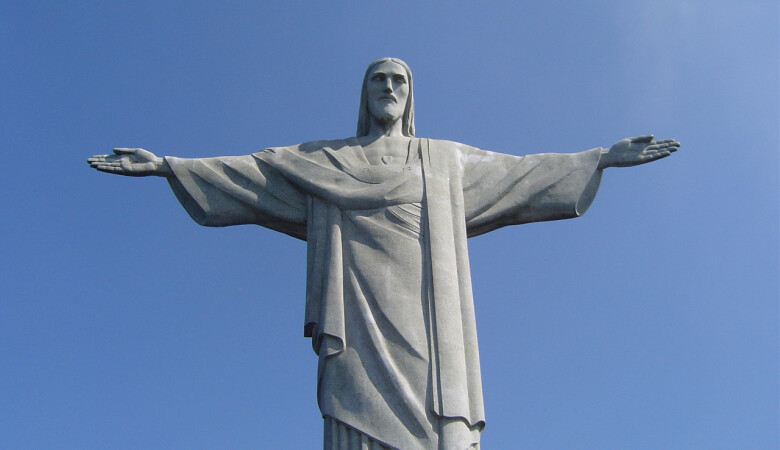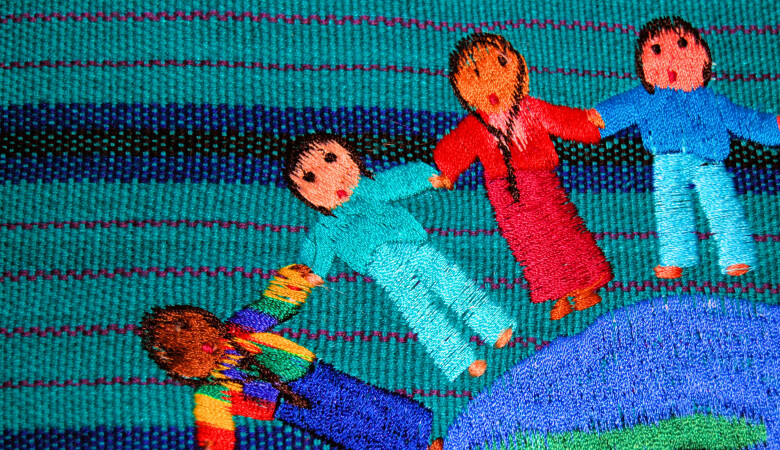Fellow Workers for the Kingdom (Colossians Sermon 21 of 21)
February 24, 2008 | Andy Davis
Colossians 4:7-18
Book Overviews, Prayer, Spiritual Warfare
So we come now to my final sermon in Colossians. And we are looking at Paul's list of his friends, his fellow workers. And as I was thinking about this, I was just thinking about the partnership we're all in, in the Gospel. As you enter the World Showcase section of Epcot Center in Orlando, Florida. The centermost pavilion is dedicated to the American experience. And if you walk in there, you're going to see 12 statues dedicated to what they call the 12 spirits of America. Makes you a little eerie actually. But as you walk through you wonder, “What are the spirits of America?” And they list them and they'd be familiar words like innovation, compassion, discovery, freedom, etcetera. But there are going to be a couple of them that you may look at with a different kind of eye. Trained by the Gospel. A statue known as independence. Another statue known as self-reliance. And another statue entitled individualism. That brings me to one of those great myths of American history, the myth of rugged individualism. You know it well, America was built on the back of the rugged individualist who left behind his family and his friends in continental Europe or wherever he came from and sailed across an ocean and made his own way in this life.
We have these icons in front of us like the trail blazer and hunter, Daniel Boone, who spent most of his adult life alone, exploring the western frontier, leaves his wife and his children, and goes out to find new ways, the Cumberland Pass or something like that and going hunting and trapping. Interesting guy. He said, "I've never been lost, but I will admit to having been confused for several weeks." So I can relate to that. But he never admitted to being lost. He always knew where he was, but he was a rugged individualist. He was alone out there in that frontier. Or later on, like “Mountain Man,” Jim Bridger, who was the first white man to see the Great Salt Lake. He was a trapper, a trader, a guide, a merchant, Indian interpreter. All of these things, did most of it alone. You picture him with two horses, his pack mule and just going through the Rockies or the High Sierra all by himself, the rugged individualist.
Or even the homesteaders who were in families but they were separated by a couple of days ride from the next homesteader. And they really made it alone. They were alone, a small family in the Nebraska prairie facing wild beasts, and Indian attacks, and prairie fires, and drought, and all kinds of things alone, making it alone. Or the cattle rancher of Texas. And that's what the statue of the 12 spirits at Epcot Center was. It was the rugged cattleman like John Wayne. He's got some equipment in one hand that says individualism and there he is. The guy who rides the fences for days on end by himself.
Rugged individualism. It's just part of the way we think of ourselves, our natural culture. Personal freedom, wide open spaces. Solitary trial faced alone and conquered alone and celebrated alone. Ralph Waldo Emerson was the original champion of individualism in America. Spent considerable time alone in Walden, Massachusetts. In a famous Phi Beta Kappa addressed in 1837 he shared what he'd learned about life. This is what he said, "I learned that no man in God's wide earth is either willing or able to help any other man. Help comes from our own bosom alone." Emerson later wrote a famous essay called "Self-Reliance" celebrating this theme. He carried it to its logical extreme, rejecting any effort to help or be helped by other people. This is what he said, "Then again, do not tell me as a good man did today of my obligation to put all poor men in a good situation. Are they my poor? I tell thee, thou foolish philanthropist, that I grudge the dollar or the dime, even the cent I give to such men as do not belong to me and to whom I do not belong."
That is self-reliance. Well, I tell you, nothing could be further from New Testament Christianity than this. Nothing could be further from it than this. And as I come to this list of greetings that Paul gives at the end of the letter. You wonder, "How is a pastor going to get a sermon out of these?" But what I look at is I look at a man who knew how dependent he was on other people, cheerfully dependent, gladly dependent. Glad to be in fellowship with brothers and sisters in Christ, knowing full well that his co-laborers in the Gospel are indispensable, to the Gospel progress in his own life and the advance of the Gospel to the ends of the earth.
Now let's get some context and I'd like to give a brief overview of what we've learned in Colossians, since this is the last time we'll be looking at this book. Paul wrote this letter to a church that he'd never visited before, a church he did not plant, but a church he was greatly concerned about. Colossae was a city in Asia Minor, currently Turkey, with nearby Laodicea and Hierapolis who was part of a triad of cities in the Lycus Valley, about 100 miles east of Ephesus built on the Lycus River. The population was predominantly Gentile, but there was a sizeable Jewish population there as well. And thus the church at Colossae had to face challenges from both ends, both from the pagan culture from which many of them had come and also from the Jewish culture that had not, for the most part, accepted Christ or the Gospel at that point. Now the church itself was planted by Epaphras. And in Colossians 2:1, he makes it plain that he'd never been there or seen them before. Now by the time he was writing, the church was already in a battle for its theological soul. Already facing doctrinal challenges from a heresy that was brewing up and that Paul felt he had to write and challenge.
Of course, there was the allurement to these pagans of going back to the old Gentile way of life with all of its Gentile way of thinking. But then there was the threat coming from the Jewish side as well of asceticism and legalism. So, you've got human philosophies, on the one hand from the Greeks. And you've got Jewish asceticism and legalism. And then through it all was this Spiritism, a worship of angels, a kind of a mishmash, a hodgepodge put together. And at the core of it were some toxic concepts to the Christian faith. For example, that the physical world was inherently evil. That God hadn't really made it. And that all of our sins come from an allurement of the physical side. And that Christ Himself wasn't truly human, wasn't truly physical. And that His work on the cross wasn't enough to save you. These are toxic concepts and Paul writes to refute every one of them. Now, as he's writing, the way he does it, he's got a two-fold strategy for the health of the Colossian church. And it's well for me as a pastor in this church, and for all of us as Christians to keep in mind how Paul is battling for the souls of the Colossians. How he's struggling for the future of the Colossian church. He does it by right doctrine, by good teaching. And by faith-filled prayer, prayer in the ministry of the Word. That sounds familiar to me anyway. And the need to keep these things in front of us, as we struggle for each other's souls as well.
Summary
Colossians 1: The Supremacy of Christ and the Mystery of the Gospel of Christ
So, let's give a summary of the book. In Colossians 1 then, Paul immediately goes to the supremacy of Christ. The greatness of Jesus Christ. This is the centerpiece of our faith, and it's the centerpiece of Colossians as well. Look at Colossians 1:15-17, just go back a few pages. And there it says, "He is the image of the invisible God. The firstborn over all creation. For by Him, all things were created, things in Heaven and on Earth, visible and invisible, whether thrones or powers, or rulers, or authorities, all things were created by Him and for Him. He is before all things, and in Him all things hold together." So, there is the material physical world, and it's not evil, it's something Christ created. And there is Christ, not a mere emanation from God, but He Himself, the creator of all things, the greatness of the person of Christ. The image of the invisible God. And at the center of our faith is this mystery.
Colossians 1:27, "Christ in you, the hope of glory." Oh, how sweet is that phrase, and how great should our hope be. Our hope is not a mere pale optimism that the future will be brighter. Oh, the future will be infinitely brighter, but hope is much stronger than that. It's an absolute certainty based on the promises of God, based on the very character of God, that we are going to spend eternity with God in face-to-face fellowship. And Christ within us, by the Spirit, is the deposit guaranteeing our future inheritance. Christ in us, hope of glory.
Colossians 2: Fullness in Christ vs. The Inadequacy of Man-Made Religion
Then in Colossians 2, he gets into the fullness that we have in Christ. We are full in Christ, complete in Christ. We don't need anything more than Christ, and the Gospel that He sought to bring. Christ gives us fullness. And so, we have in Colossians 2, fullness in Christ versus the inadequacy of that false religion that the heretics there in Colossae were teaching. So first, the fullness of Christ, it says in Colossians 2:9-10, "For in Christ, all the fullness of the deity lives in bodily form, the mystery of the incarnation." The fullness of deity, fully God in bodily form, fully man, the incarnation.
In Verse 10, "And you have been given fullness in Christ." We are full and complete in Christ. You don't need anything more. The world has nothing it can add to you. You have everything in Christ. We are fully circumcised spiritually, that's addressing the Jewish side, Jewish legalism. We can't be any more pleasing to God, having been circumcised physically, than we are circumcised spiritually in our hearts by the Spirit. We are fully alive, at one point, “we were dead in our transgressions and sins, but God made us alive with Christ,” and now we are fully alive, and we shall never die. Forever, we are alive in Christ. And we are fully forgiven. Remember how we pondered the benefit to us if we were only partially forgiven. If God forgave 99% of your sins, you're still lost. That 1% would be sufficient to sink you for eternity. But we are fully forgiven. He forgave us all our sins.
Colossians 2:13, "And we are fully free from the law." By this I do not mean we don't need to love our neighbor as ourselves, and we don't need to love God with all of our “heart, soul, mind and strength.” We are empowered by the Spirit to do those things, that's not it. But we are free from the law and its power to condemn us to Hell. It has no power to do that, for Christ has fully met all of its precepts, all of its laws and regulations. They're met in Christ and in the perfect righteousness that God gave us through faith in Christ. We are fully, therefore, free from the law. And we are fully triumphant over Satan. Just as Christ was triumphant over the powers and the principalities, and triumphed over them by the cross. So, we also are triumphant over Satan. There is nothing that Satan can do to destroy our souls, to bring us down to hell. We are secure in Christ, and fully free therefore from Satan's power.
Well, we have all of that, what do we need with this mishmash, this false religion that the heretics were seeking to put over on us? Therefore, beware about man-made philosophies. Take care about them and watch out for them. Watch out for human legalism. The idea that through your efforts, you can improve your standing with God. Watch out for legalism. And mysticism. The worship of angels is what it said there in Colossians 2. But any kind of mystical experience is cut off from the Gospel of Christ. We're not talking about a deepening in your walk with God, where you have a greater sense of His presence, you should seek that through the Spirit. That's not it, this is the worship of angels, this is a false mysticism. False religion. And then there is asceticism, the harsh treatment of the body.
Again, the basic underpinnings there, the basic concept, is that the physical body is evil. And that salvation is away from the physical body. Friends, it is not. God intends to save the physical body. We're going to be resurrected in a physical body. We're going to spend eternity in physical bodies. We're going to a place. Jesus said, "I go and prepare a place for you." And we're going to dwell there forever and ever. This is false religion. It's a heretical mishmash, and it's attacking the fullness we have in Christ. And so Paul refutes it by right doctrine.
Elements of a Truly Happy, Fruitful New Life
But then he gives a picture in Colossians 3, of the true Christian life. Of how sweet is that life, how fruitful, and how wonderful. I think Colossians 3:1-17, I think you ought to memorize it. I've said before, because it would enrich your life. If you would just know these things and put them into practice, you will be happy forever. You will be fruitful forever. You will be strong against temptation. In the first section is a heavenly mindset based on the truth of the Gospel. "Since then you have been raised with Christ," Colossians 3:1, "set your hearts on things above, where Christ is, seated at the right hand of God. Set your minds on things above, not on earthly things. For you died, and your life is now hidden with Christ in God. When Christ who is your life appears, then you also will appear with Him in glory." Think about this. Think about the greatness of it. We talk in our culture about guilty pleasures. This is an innocent pleasure, pure. Think much about your future happiness in heaven. Live there as much as you can in your minds, and you'll be empowered to serve Him with great energy and joy in this life. “Set your heart on things above not on earthly things.”
And then secondly, you've got to be at war. You've got to “put to death, therefore, whatever belongs to your earthly nature, sexual immorality, impurity, lust, evil desires, greed,” put them to death. The Holy Spirit gets you dressed for battle every day and sends you off to mortify the deeds of the flesh, so you must do. And you must put these things to death, or you cannot be happy, you cannot be fruitful in the Christian life.
And thirdly, understand that God has saved you up. As I was praying in my pastoral prayer, God has saved us into a community. We're in a family. When someone loses a loved one, that should matter to us. We should put an arm around them. Weep with them. Pray with them. It should make a difference. And this community has come from people all over the world. People that are very different from us. And here there's "no circumcised, uncircumcised, Barbarian, Scythian, slave or free. But Christ is all and is in all." That's who we are. We're put together. And we don't get to choose who the brothers and sisters are, God did that from “before the foundation of the world.” What we're told to do then, is to clothe ourselves with compassion, kindness, humility, gentleness, and patience, and welcome brothers and sisters in Christ. And know that we are in a rich community together. And we need to walk together with other Christians in that new self.
And then personally, individually, we should saturate our hearts with Christ. We should, “let the peace of Christ rule in our hearts.” And we should, “let the word of Christ, dwell richly in our hearts.” And whatever we do, we should do it all in the name of the Lord Jesus. Giving thanks to God the Father through Him. So Christ saturating even the simplest thing you do, washing the dishes, or praying, or interacting with your family members, or your time at work. Whatever you do, you're doing it to the glory of God through Jesus Christ. “And be thankful.” Be thankful that you've been delivered from Hell, and you're going to Heaven. Is that not enough for you? Be thankful forever for these riches that God's given. So this is the rich full new life in Christ, Colossians 3:1-17.
But then the Lord wants to see us live it out in certain arenas. You think about the arena like the Colosseum, the sands of the Colosseum, where the courage of first generation Christians, were put on display as their blood was spilled. As lions killed them. And the audience was watching. The Roman audience, the pagan audience, watching how they lived, and watching how they died. So also we are to live out the new Christian life in various arenas. First marriage, the most key human relationship there is. And so he urges that this new life be lived out in a marriage. “Wives submitting to the husbands.” “Husbands loving their wives and cherishing them.” And then in the parent child relationship, second most important. Second most significant human relationship there is. The children will be trained in the Lord, and that parents would love their children, and not be harsh with them, but train them well, and bring them up. And then the arena of labor.
As we understand it now in the 21st century, the master-slave relationship is labor. It's got to do with work. And the laborer should work as unto the Lord, knowing that in effect, he's taking his work as an offering and giving it up to Jesus. And the master, the one in charge, should treat his slave, his servant, his employee, the way he has been treated by Christ, and the way he wants to be treated as well. So in that arena as well, the new life, saturating. And in our daily life conversation, in the way we carry on just what we talk about, and our prayer lives, and all of these things saturated with the Gospel. This is the full life that Paul has given us. Much better than the life that the heretics were trying to give. A life of trying to escape from the body. And thinking that Jesus isn't enough, and that you've got to have some specialized knowledge and all that, that seems like nothing compared to the true Gospel.
No One Can Do It Alone
So now we come to Paul's final greetings, and I guess as I look over Paul's attitude here, as he writes to each of his friends, I come to this one concept, and that is not one of us cannot do it alone. We cannot do it alone. Rugged individualism is impossible in the kingdom. Moses couldn't do it alone. God gave him 70 elders to help him in the leadership of Israel. Jesus chose 12 apostles as part of his strategic way of advancing the gospel. And together they built the church. Even the great apostle Paul couldn't plant churches alone, but frequently at the end of his letters he writes speaking of his co-laborers, both men and women. And how God used them, this dear brother or this dear sister, a co-laborer in the gospel and they worked together. By the way, I had co-laborer, Microsoft kicked it out. It's not a word according to Microsoft. Well, fellow workers, is that better? But you know what I mean, don't you? By co-laborers. So we got that little red squiggle underneath, and I can either add it to the dictionary or I can use something else. So in the translation, they gave us fellow workers for the kingdom. And that's what we are. But you know what I mean by co-laborers and he's writing to each one of them.
And basically, the bottom line lesson here is that none of us can do any of it alone. Away with self-salvation. Satan is trying to sell it all the time. You can save yourself by your own efforts, by being a good person, by philosophy or mysticism or legalism or any of these things. You can save yourself, away with it, you can't. God has testified to this by sending his Son Jesus Christ to shed his blood on the cross as a testimony to the fact that we could none of us save ourselves. Galatians 2:21 says, in effect, "If salvation could be worked out by obedience, then Christ died for nothing." Well, Christ didn't die for nothing because it can't be worked that way. And therefore I say to you, if you've never come to faith in Christ and you care about the salvation of your soul, you have a choice. You can either try to save yourself, through your own individual effort and you will fail. Or you can turn to Christ and you can look to the cross of Christ and see him having shed his blood on the cross for sinners like you and me. And you can turn away from self and turn to Jesus and he will save you.
And so I urge you to do that. That is the Gospel. But it doesn't end there. It's not like now that I have been justified I can now be sanctified by my own efforts. I can finish my race alone, no way. Jesus said in John 15, a very famous image, "I am the vine, and you are the branches. If a man remains in me and I in him, he will bear much fruit, for apart from me, you can do nothing." And so having begun dependent on Christ we will proceed dependent on Christ to the very end. Completely dependent on Christ. But secondly, we also need to feel our need for each other. We can't do it alone. We are not independent of one another. 1 Corinthians 12:21 and 22, Paul uses the analogy of the human body and we are the Body of Christ and we're all together in Christ and he the head. And so he says, "The eye cannot say to the hand I don't need you. And the head cannot say to the feet, I don't need you. On the contrary, those parts of the body that seem to be weaker are indispensable." Every part of the body is indispensable. We need each other. We really do. And you have to convince yourself of that. Because we got that American independence. That American self-reliance, build a statue to them one after the other. That American individualism. It doesn't work in the Christian life. It's impossible. We need each other. And so Paul goes person by person. Another thing happens to me as I read these things. I think "If Paul knew me, what would he write in a few lines about me? If you could sum it all up in a couple of lines what would it be?" And far more important than that, what would Jesus say? If He gave me a nickname kind of summing up my life, what would it be? If He summed it all up in a few lines, what would my life and my ministry be? That's what it makes me think about. So let's look at them one at a time.
Some Lessons from Paul’s Laborers
The Faithful Servant: Tychicus
First, we have the faithful servant. Tychicus, look at verses 7-8. “Tychicus will tell you all the news about me. He's a dear brother, a faithful minister, and a fellow servant in the Lord. I'm sending him to you for the express purpose that you may know about our circumstances and that he may encourage your hearts.” There's a lot of nuts and bolts in these greetings. I'm sending him as a messenger. He's going to tell you what's going on with us. But there are a few extra things that he says. This man is a faithful servant. Faithful means what has been entrusted to him before, he sticks with it, he perseveres and he brings forth the harvest. He's faithful. He's an overcomer. So as I look at this as I think about myself, am I faithful to what's been entrusted to me? Am I faithful? Are you a faithful servant in the Lord?
The Forgiven Sinner: Onesimus
Secondly, we have the forgiven sinner, Onesimus. Now, I believe that Ephesians, Colossians, and Philemon are written around the same time and sent together, all of them together. I think it's the letter that he refers to concerning the church at Laodicea, more about that in a moment. But Philemon of course is the story of an escaped slave who ran away and went to Rome. And there he meets up with the apostle Paul and Paul converts him. And now he's sending Onesimus back to Colossae, turns out that he's from this church. He says he's one of you. And so with him is also the letter to Philemon and which Philemon was one of that church as well and he was being urged to welcome this runaway slave back not only as a slave but as a brother, and forgive him. It's a beautiful letter and it's very, very artfully written, Philemon. And where Paul says, "If he owes you anything, then write it down to my account, not to mention you owe me your very life." So he twists his arm a bit there and says, "Please forgive him richly, accept him back richly." All of that within this Colossian church. It's a very sweet letter but there is Onesimus, he the forgiven sinner. And that's what all of us are, isn't it? Aren't we all runaway slaves who ran away from our true master, God? We don't want to serve Him anymore. We want to be on our own like the prodigal son, doing our own thing. And now we're being sent back to the true master of our souls and He will welcome us back. He will welcome us back richly and so Onesimus.
The Fellow Sufferer: Aristarchus
And then we have the fellow sufferer, Aristarchus verse 10, "My fellow prisoner Aristarchus sends you his greetings." We don't know anything about this man other than he was Jewish, he comes before verse 11 so he's one of the Jews. And therefore I think he probably suffered greatly from the other members of his Jewish community. We know in the life of Jesus, that the hierarchy had already decided that anyone who claimed that Jesus was the Messiah would be put out off the synagogue. And so it could be that was the nature of his suffering.
The Future Surprise: Mark
But then we have this future surprise and that's Mark. Now by this time there's already been some, I think, water over the dam. Mark has already been turned back to fruitful service in the Lord. But look at verse 10, “Mark the cousin of Barnabas, he is also sending you, received instructions about him, if he comes to you, welcome him.” Mark has a long and fascinating history. Mark, John Mark, cousin of Barnabas accompanied Paul and Barnabas on their first missionary journey, gets halfway through and doesn't want to do it anymore. And it's not blameless, it's not like he had urgent business, he had to go away. It was a sin. He turned away, he was not faithful, and he turned away from his work. So much so, that when it was time for Paul and Barnabas to go back, and visit some of those churches they planted, Barnabas wanted to take John Mark, give him a second chance. Paul said "No way." There's no way. And we can see both of their points of view. You know, this was an important work, and that he had already proven unsteady, unfaithful. "You don't want somebody like that in the firing line right next to you, and so I'm not taking him." Well, Barnabas, son of encouragement, his name was Joseph, a Levite from Cyprus, son of encouragement. He's the kind that would put an arm around somebody who is down and out, like Saul of Tarsus who've been recently converted and nobody wanted to get within a mile of him, the persecutor of the church.
It was Barnabas that brought him into the church in Jerusalem and said, "You know, he's done well. He's preached the gospel faithfully in Damascus." Paul should have known Barnabas better than that. Barnabas was urging that we give John Mark another try. But they had such a sharp disagreement that they parted company and went separate ways. And God ended up using it. Then you have Paul and Silas going through Philippi and bringing the gospel there, and so they go. And Barnabas and John Mark continue their way, but by this time John Mark has been clearly reclaimed for the Gospel and he is useful in the ministry of Christ. And later, Paul says that, final epistle, final word from Paul is that "Mark is useful to me and my ministry." Well, he's been useful to all of us and if you ever read the Gospel of Mark and from that perspective we get an insight into the life of Jesus that God wanted us to have, and He used this man, this reclaimed failure in ministry, to write it, Mark.
The Fearless Stalwart: Justus
And then we have the fearless stalwart, somebody courageous, Jesus, who is called Justus, sends greetings. Another Jew, who is willing to stand firm against his countrymen for the Gospel. "These are the only Jews", he says, "among my fellow workers for the kingdom of God, and they have proved a comfort to me." And you can imagine why, you know why, because everywhere Paul went, the first place he goes is to the synagogue, and he preaches the gospel in the synagogue until in effect they throw him out. He's always got a handful of converts, the remnant, that he writes about in Romans 9-11, but it's not many. And so therefore, any Jews who had turned to Christ and believe in him were a great encouragement to the Apostle Paul.
The Fierce Struggler: Epaphras
But now we get the fierce struggler and, Epaphras, I want to spend some time on. Epaphras convicts me, and why? Because he is an incredible prayer warrior, a man of prayer. Look at verse 12 and 13, "Epaphras, who is one of you and a servant of Christ Jesus, sends greetings. He is always wrestling in prayer for you, that you may stand firm in all the will of God, mature and fully assured. I vouch for him that he is working hard for you and for those at Laodicea and Hierapolis." This is one of the best brief descriptions of a prayer warrior you're going to find anywhere in the Bible. Epaphras, who's wrestling in prayer, and the Greek word 'agon' from which we get this idea of agonizing prayer, means a wrestling contest, that's what he is doing, and he is doing spiritually, like Daniel who fasted and prayed for 21 days until the heavenly messenger at last fought his way through the Prince of Persia, I think Satan or one of Satan's henchman and gets the message though after 21 days of wrestling prayer, it's hard work, spiritually, and Epaphras gave that kind of effort. May his tribe increase, may his spirit increase in my heart. Prayers work, he says, I tell you that he is working hard for all of you. It's hard work to be praying for people.
Church History Example: David Brainerd
Now, I love to get examples from church history and I can think of no better example, and I mentioned last week, in wrestling prayer, than David Brainerd. David Brainerd lived in the 18th century, the first half of the 18th century. He was a missionary to the American Indians on the frontier there, a contemporary of Jonathan Edwards. He died of consumption tuberculosis at age 29. Very brief life. He had been a missionary to the Indians only four years. Very, very short time of missionary service. Why then has his life had such an incredible impact on the spread of the Gospel and specifically on missions as it had? Out of all proportions to its brevity and this short length of his service with the American Indians. Why?
Well I think it's because he was a man of prayer who wrestled so faithful in prayer and wrote about those wrestlings in his diary. And then Jonathan Edwards took that diary and published it and it's never gone out of print since. Still in print today. And when you read it, you can just feel the fire of the Holy Spirit coming through the words, you're with him as he wrestles, you can feel the urgency, you can feel the passion, the fire. There's a heat there. There's sweat pouring from his body. And he teaches us how to do this kind of wrestling prayer.
Great men of God have found his work to be of tremendous example for each one of them. John Wesley said, "Let every preacher read carefully over the life of Brainerd." It was said of Henry Martin the great missionary, "Perusing the life of David Brainerd, his soul was filled with such a holy emulation of that extraordinary man, and after deep consideration and fervent prayer he was at last fixed in a resolution to imitate his example and become a missionary." So it was Brainerd that led him into the missionary life. William Carey regarded Edwards' Life of Brainerd as a sacred text. So also Robert Morrison, Robert Murray McCain of Scotland, John Mills of America, and even Jim Elliot of the modern era, read these diaries and it inflamed them with a drive a desire to be poured out for Christ. And why? Well, listen to these words. This is David Brainerd from his diary.
He said, "Oh, that I might be a flaming fire in the service of the Lord. Here I am Lord, send me. Send me to the ends of the earth, send me from all that is called earthly comfort. Send me to death itself if it be but in thy service to promote thy kingdom." Well, you don't need to read many pages like that before you're really at a fork in the road in your Christian life. Am I going to be mediocre and cold and lukewarm? Or am I going to be passionate on fire for Jesus? Because I can't read this kind of stuff and stay where I am. Brainerd overcame incredible obstacles through prayer, he overcame almost constant sickness, coughing up blood. He overcame relentlessly recurring, cyclically recurring depression, moodiness, black moods, depression. He overcame loneliness out in the wilderness. He overcame immense external hardships, poor food, exposure to the elements, extreme cold, inadequate shelter. He overcame a personal lack of love for the Indians.
It wasn't a romantic thing with him in terms of the mission life. Now he knew what it was like and it was a struggle for him. Struggle, and how, by wrestling, wrestling, wrestling in prayer like a Epaphras, wrestling over himself. And he wrestled for the internal journey, he wrestled for personal holiness. This is what he said, "When I really enjoy God, I feel my desires of Him the more insatiable, my thirstings after holiness, the more unquenchable, oh for holiness, oh for more of God in my soul, oh for this pleasing pain. It makes my soul press after God, oh that I might not loiter on my heavenly journey." I have done some loitering brothers and sisters on my heavenly journey. Taken a break in my sanctification. He's saying "Oh that I may never do that." My guess is he had too as well but he didn't want to. "Oh that I may not loiter on my internal, my heavenly journey." He wrestled also for that external journey, he wrestled for the conversion of Indians. Could it be we see so few people baptized in this church because so few people wrestle for specific souls in prayer? Could it be? Once when visiting in a home with friends he got alone to pray, he said this, I continued wrestling with God in prayer for my dear little flock here, and more especially for the Indians elsewhere, as well as for dear friends in one place or another until it was bedtime and I feared I should hinder the family. So they have the guy over for dinner and he's upstairs praying in a room and they're wondering if they should go ahead and eat without him. "But oh with what reluctancy did I find myself obliged to consume time and sleep. I didn't want to sleep, I wanted to keep praying." We read of him spending whole days in prayer, sometimes setting aside six times in the day to pray. Sometimes seeking out a family or friend to pray with.
He prayed for his own sanctification, he prayed for the conversion of Indians, he prayed for the advancement of the Kingdom of Christ in America and to the ends of the Earth, this is how he prayed. His journal is filled with entries like this. Wednesday, April 21st, "And God again enabled me to wrestle for numbers of souls and had much fervency in the sweet duty of intercession." Four days later, Lord's Day April, 25th. "This morning I spent about two hours in secret duties and was enabled more than ordinarily to agonize for immortal souls. Though it was early in the morning and the sun scarcely shined at all yet my body was quite wet with sweat." Saturday, December 15th, "Spent much time in prayer in the woods and seemed raised above the things of this world." Oh boy, see there's the payoff right. Setting your heart on things above and God just lifts you up a bit and gives you a sense of His presence. One biographer talked about one occasion in his life July 21st, 1744, on hearing that the Indians were planning on holding an idolatrous feast and dance the next day, he spent that whole day and that whole night fasting and praying for them.
And he writes "This morning, about nine, I withdrew to the woods for prayer I was in such anguish that when I rose from my knees I felt extremely weak and overcome and the sweat ran down my face and body. I cared not where or how I lived or what hardships I went through so that I could but gain souls for Christ, I continued in this frame of mine all evening and all night." Thus empowered, he went forth and met the Indians as they were beginning their feast, their pagan feast. Convinced that God was with him in his contest just like Elijah on Mount Carmel, he knew he was going to be able to confront them. And instead of promptly scalping him, they listened to him preach all that day and on into the evening and many were converted. Oh that's power, do you see? Power for souls and it comes the root of it, the furnace of it, is prayer. "Oh that God would work in our hearts," this kind of wrestling in prayer. That He would work it in my heart and in yours.
Make us like Brainerd. Make us like Epaphras. Make us like the apostle Paul. Make us like Jesus. Whoever lives, it says, to intercede for us at the right hand of God, never stops praying for you and me.
The Foreign Specialist: Luke
Then we have the foreign specialist, Luke verse 14, “our dear friend, Luke the doctor greets you.” He was not a Jew. We know that because the line of demarcations in verse 11 and everyone after was not a Jew. So he was a Gentile, a doctor, therefore a specialist. First of many missionary doctors, let's say, who went and plied their trade for the glory of God on the mission field. But that was Luke, and from him of course we get the Gospel of Luke and also the Book of Acts.
And then we have the heart breaker, the future scandal, Demas. Demas, right alongside Luke just listed there. But we know more about Demas sadly from 2 Timothy, Chapter 4. In verse 9 and 10, it says "Do your best to come to me quickly for Demas, having loved this present world, has deserted me and has gone to Thessalonica." Can you not feel the pain in those words? "Demas, having loved this present world," where it says in 1 John 2, "Do not love the world or anything in the world." What could have been in Thessalonica worth his eternal soul? What was so attractive about Thessalonica to Demas that he turned his back on Paul? He abandoned him. "He has deserted me." That's what Paul says of Demas. No hint of it here, though. Many a pastor, many a disciple maker, many a parent has been heartbroken by the defection of someone from an apparent walk with Christ to turn their back on Jesus and stop walking with Him any longer.
Final Applications
“Read My Letters”
Final application verses 15-18. I'm going to just get our own applications right from Paul's text here. First of all, read my letters. Okay? Read my letters. He says "Give my greetings to the brothers at Laodicea and to Nympha and the church in our house and after this letter has been read to you, see that it is also read in the church of the Laodiceans and that you in turn read the letter for Laodicea." So read each other's letters. It's not reading each other's mail. It's not wrong for you to read the Letter to Philemon. God meant for you to read it.
Ordinarily, it's bad to read somebody else's mail, ought not to be done. But here, we ought to read the Letter to Philemon. We ought to read all of Paul's letters. They're right here for us to read. And so read the Scripture. Saturate your minds. Now let's talk about that letter from Laodicea. We think it's probably the cyclical letter of Ephesians. It wasn't just written to one church, but it was written to a whole area and I think that was the letter from Laodicea. There's a tremendous similarity between Ephesians and Colossians. I think they're written about the same time. So read Ephesians, read that letter from Laodicea.
Now a word to the Laodicean church, you ought to read it too. Because their future is pretty black. It's pretty bleak. Remember what Jesus said about the church at Laodicea in Revelation 3? They were the lukewarm church that He wanted to spew out of His mouth. They were neither hot nor cold. I wish you were one or the other. But because you're “neither hot nor cold, I'm about to spew you out of my mouth.” You say, "I am rich. I have acquired wealth and do not need a thing. But you do not realize that you are wretched, pitiful, poor, blind, and naked." That's advice given by Jesus earlier as the Apostle Paul who wrote them a letter. They ought to heed it, don't you think? Lest God remove that lampstand.
Complete Your Ministry
Second application is complete your ministry. First of all, you need to have one in order to complete it. He says to Archippus, "See to it that you complete the work you've been given by the Lord." What is that? I mean in your case? Are you able to identify a ministry? I don't mean a Christian lifestyle in the midst of an ordinary, you know American lifestyle. I mean a ministry. Has He entrusted you with a ministry? Has He set before you race for you to run? Like Paul says, "I count my life worth nothing to me, if only I may finish the race and complete the task the Lord Jesus has given me." The task of testifying the gospel of God's grace. Alright. If that is not your task, what is? Has Christ entrusted anything to you. If so, like Archippus, see to it that you complete it. It's not how you start friends. It's how you finish.
And if you're sitting there in the pew today and you say, "I really don't have a ministry. I really don't know how I'm using my gifts. I'm really not involved in this church. I'm not really doing anything really for Christ." Then I would urge you, quickly, repent. It's not how you start friends, it's how you finish. And Paul says at the end, he says, "I have fought the good fight. I have finished the race. I have kept the faith. I've completed the task God gave me to do." So like Archippus, see to it that you complete your ministry.
Suffering: Remember My Chains
And then thirdly, suffering. He says "remember my chains." Lots of Christians in chains today. In the 10/40 window, in China, there are house churches, with their pastors under arrest for simply preaching the Gospel. In the Muslim worlds, there are martyrs every day. In Darfur, in other places, remember the suffering church. Remember them in prayer. Lift them up as though you yourself are suffering with them. And then finally, grace be with you. Grace be with you. Without this, we can do nothing. Close with me if you would in prayer.





















